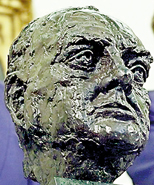Sunday Times 2
Gore Vidal: Sharpest tongue in the West
A brilliant wit, he was related to – but hated – the Kennedys and thought the U.S. was in terminal decline. No wonder Gore Vidal had so many enemies…
Gore Vidal was entitled to claim that he was the wittiest and most elegant writer of his time. And claim it he often did. For modesty was not his principal virtue. Indeed, it was one of the reasons he made so many enemies.
Asked why he excited so much antagonism, Vidal always explained that he was one of the few people in the world who spoke in perfect sentences – a talent which particularly infuriated literary rivals, whom he said were lucid only on paper.
Vidal’s writings are saturated with a sense that the world, and in particular the United States, were in terminal decline. The great age of empire was over, and America, he believed, had abandoned itself to the ‘cult of stupidity’. He said: ‘The genius of our ruling class is that it has kept a majority of the people from ever questioning the iniquity of a system where most people drudge along, paying heavy taxes for which they get nothing in return.’

Opinionated: This 1974 photo shows Vidal during an interview in Los Angeles
The Vidals were American aristocracy. His father, Gene, was director of air commerce in Franklin D. Roosevelt’s administration and was said to be the handsomest man in Washington society. He was also a serial adulterer.
Vidal’s mother, Nina, was an alcoholic and, at her worst, suicidal. His parents’ marriage collapsed and Vidal, their only child, was sent to live with his maternal grandfather, Thomas Gore, Democratic Senator for Oklahoma. The Senator was blind. Vidal recalled: ‘When he discovered a grandchild with a passion for reading, I became his favourite.’
The precocious Vidal was educated at Exeter College – one of the top undergraduate ‘schools’ of New England. But, for reasons he never explained, he did not go on to Harvard, Yale or Princeton with other members of his social class.
He then served during World War II as a warrant officer (junior grade) – mostly in the Aleutian Islands of the Northern Pacific Ocean as helmsman on a supply ship.
For a man of his background, a commission would normally have been a formality. Although he claimed his bad eyesight was to blame for keeping him in the ranks, it was his homosexuality (discovered while still at school) that undoubtedly was equally responsible for his prolonged stay on the lower deck.
Vidal was always open about being what he called a ‘fag’ – even at a time when homosexuality risked instant ostracism.
In 1946, the year after he left the U.S. Navy, Vidal wrote Williwaw – a war novel which brought him instant acclaim. This success, though, was short-lived because his third book (The City And The Pillar, whose subject was homosexual life in New York) received a hostile reaction.
The senior book reviewer of the New York Times vowed ‘never to read him again after experiencing this disgusting book’.
Vidal spent ten years in exile from New York, some of it in Guatemala, and wrote TV and film scripts and short stories under the name of Edgar Box. He lived in Paris and Florida and his name appeared as a scriptwriter in the credits of several movies such as Ben-Hur.
During this period he befriended the playwright Tennessee Williams, who let him adapt his work Suddenly Last Summer for the screen.
Vidal enjoyed this Hollywood period but he was, by nature, a writer. As soon as American publishers were prepared to risk the wrath of the New York Times, he felt able to return to the written word.The result, Myra Breckinridge, ‘the story of a character who is apparently a woman, but who turns out to be a man’, was a literary sensation.
Throughout these ‘golden years’ in the Forties and Fifties, Vidal lived the sybaritic life of American high society – securing invitations to the best dinner parties.There followed a series of novels about the early years of the American Republic. They reflected his view that the Founding Fathers had created a model of democracy that later American presidents had destroyed with their autocratic power.
In 1960 – choosing, for a change, to participate rather than philosophise – he stood in New York as a Democratic nominee for the House of Representatives. He lost, but won more votes in his congressional district than John F. Kennedy, the presidential candidate.
Vidal had a family link to the Kennedys. After his parents’ divorce in 1935, his father married the stepmother of JFK’s future wife, Jackie. This made Gore Vidal her half-brother, once-removed.Vidal was, however, defiantly unimpressed by his association with America’s first family. He said JFK was ‘one of our worst presidents’, his brother Bobby was ‘a phoney’ and their father, Joseph, was ‘a crook’ who ‘should have been in jail’ and who had ‘bought’ the presidency for his son.
He described the Kennedy family’s ascent as an ‘ardent struggle ever upward from the Irish bog’ and with tragic foresight he called the job of the presidency ‘literally killing’ and worried that ‘Kennedy may very well not survive’.
Nor was he charitable about Jackie Kennedy, who he claimed ‘lost her virginity in a lift to a writer from the Paris Review’. For her part, she complained that Vidal had always made her feel ‘like a Philistine’.
Happily, he made other enemies – considering Ernest Hemingway a joke and comparing Truman Capote to a ‘filthy animal that has found its way into the house’.
Vidal had an old-fashioned belief in honour, albeit combined with a modern will to live as he pleased. He wrote in his memoir that he’d had more than 1,000 ‘sexual encounters’. Also, he was fond of drink and claimed that he had sampled every major drug.
Throughout his adult life (for more than 50 years), Vidal lived with Howard Austen, a sometime singer and advertising executive. He insisted that they observed his rule of life that ‘sex drives more couples apart than it holds together’ by not sleeping with one another.
Whatever their physical relationship, Austen behaved like a domesticated wife and looked after Vidal.
For 25 years, they lived together in the Italian village of Ravello and returned to America (which he described as ‘the land of the dull and the home of the literal’) only in 2003, so that Austen could be treated for cancer. However, he died later that year.
© Daily Mail, London
comments powered by Disqus























